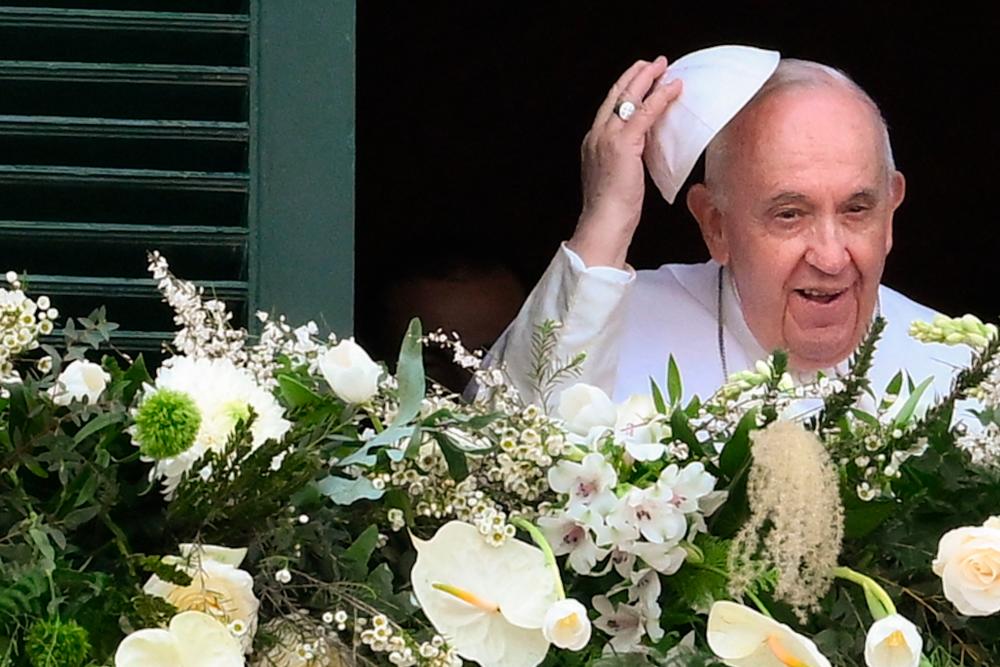VALLETTA: Pope Francis reminded Malta of its roots as a “safe harbour” in his first visit to the Mediterranean island nation Saturday, warning it not to succumb to isolation and fear amid migrant crises on multiple fronts.
The 85-year-old pontiff's visit to the archipelago, delayed two years due to the coronavirus pandemic, now comes as war in Ukraine has unleashed Europe's worst refugee crisis since World War II, with more than four million fleeing the country.
Invoking “the dark shadows of war” spreading across Eastern Europe and castigating those “provoking and fomenting conflicts”, Francis similarly recalled the ongoing influx of migrants from the south who try to cross the Mediterranean to reach the island shores of Malta, given its strategic position south of Sicily and to Africa’s north.
“According to its Phoenician etymology, Malta means ‘safe harbour’,“ the pope said in his opening address to Maltese dignitaries, including Prime Minister Robert Abela, at the Grandmaster’s Palace, the former seat of the Knights Hospitaller who ruled for centuries over the archipelago.
“Nonetheless, given the growing influx of recent years, fear and insecurity have nurtured a certain discouragement and frustration,“ Francis said, warning against “adopting an anachronistic isolationism”.
Don't look away
Malta, with a population of just over a half a million inhabitants, has argued it is unfairly penalised for its geographic position and takes a disproportionate share of migrants arriving by sea from North Africa, given its small size.
The heavily Catholic country has come under fire by charity rescue groups patrolling the Mediterranean, charging that Maltese authorities turn a blind eye to migrants in peril in its waters.
“The growing migration emergency -- here we can think of the refugees from war-torn Ukraine -- calls for a broad-based and shared response. Some countries cannot respond to the entire problem, while others remain indifferent onlookers,“ the pope said.
Addressing the conflict in Ukraine, in what appeared be a barely veiled reference to Russia’s Vladimir Putin, Francis said “some potentate, sadly caught up in anachronistic claims of nationalist interests, is provoking and fomenting conflicts...”
Legality and transparency
Francis was limping visibly upon his arrival Saturday morning at Malta's airport at the outset of his two-day official visit -- the first for the pontiff this year.
After using a lift for reduced mobility passengers to board and disembark the plane, he appeared at one point to stumble on the tarmac's red carpet as he grasped the arm of President George Vella at his side.
Among the crowds who lined the streets to see the pope pass by was Joanna Sultana, 41, who was surrounded by children waving yellow and white cardboard Vatican flags.
“I caught just a glimpse, but it was worth it!” said Sultana. “I hope he gives a message to be kinder, and a message of peace to everyone.”
Francis' visit to Malta follows those of his predecessors Benedict XVI in 2010 and two visits by John Paul II, in 1990 and 2001.
The country's reputation on the international stage remains shaken by the 2017 murder of journalist Daphne Caruana Galizia, who before her death was investigating corruption at the highest levels of government and business.
Francis called on Malta -- which is included in a list of countries monitored by a G7 task force for money laundering -- to shore up transparency and justice, as “essential pillars of a mature civil society”.
“May your commitment to eliminate illegality and corruption be strong, like the north wind that sweeps the coasts of this country,“ Francis said.
“May you always cultivate legality and transparency, which will enable the eradication of corruption and criminality, neither of which acts openly and in broad daylight.”
On Sunday, the pontiff will conduct mass before a huge crowd in Floriana, near the capital Valletta, following a visit to the Grotto of St. Paul, where the apostle is believed to have sought shelter after being shipwrecked on Malta.
He will visit migrants living at the Hal Far peace lab, a migrant centre founded by a Franciscan friar in 1971 in honour of former pope John XXIII.
The centre currently houses 55 young male migrants from across Africa but is preparing for refugees from Ukraine.
Francis is scheduled later Saturday to take a catamaran from Valletta's Grand Harbour to the island of Gozo, where he will preside over a prayer meeting at the national shrine of Ta' Pinu. - AFP














